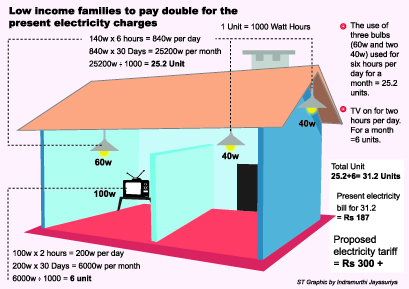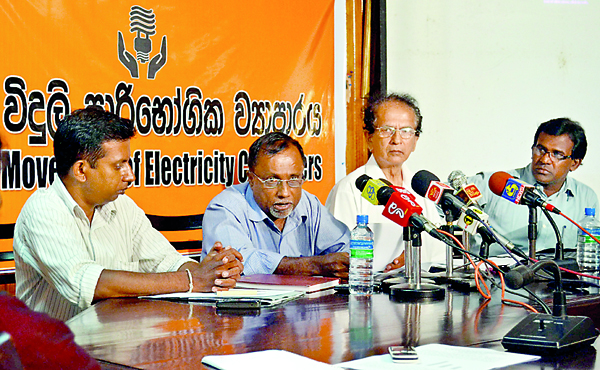News
CEB proposes to give huge shocks to those who can least bear it
View(s):By Chamal Weerakkody
More than three million electricity consumers, whose usage exceeds 90 units will be the hardest hit by the newly-proposed electricity tariff as their monthly bill is set to increase drastically, CEB statistics reveal.
Among the worst hit will be the consumers of 30 units of electricity since their monthly income may not be sufficient to accommodate the soon to be increased electricity charges.
According to CEB figures, 75 per cent of the five million domestic consumers use between one and 90 units of electricity per month. The new electricity tariff proposes increased percentages for this group divided into four blocks.
The increase for the first block (0 – 30 units) is 53 per cent, for the second block (31 – 60 units) it is 47 percent, for the third block (61 – 90 units) it is 59 percent and for the fourth block (91 – 120 units) the increase is 54 percent.
The proposed electricity tariff coming in the wake of the recent price hikes on fuel, bread, gas and three-wheeler fares have hit the low income earners.
Educational programmes are to be initiated by the CEB for the public on how to reduce their electricity consumption.
Mahesh Sankapriya, a teacher told the Sunday Times the steep increase in the proposed tariff could be averted if the relevant authorities take the initiative to reduce unnecessary electricity wastage such as floodlighting State institutions and keeping street

A news conference denouncing the proposed hikes held by the Movement for Electricty Consumers. Pix by Hasitha Kulasekera
lights burning during the daytime, especially in urban areas, resulting in low income earners having to bear the burden as a result.
He pointed out that students will be the main victims due to the proposed increase as they use electricity for their studies at night but now their parents may enforce restrictions on using electricity, fearing they would have to meet high bills.
Endorsing Mahesh Sankapriya’s views, J. Rani, a self-employed businesswoman said that her grand children are even now facing difficulties in studying at night due to the current electricity bills which have not been fully paid yet due to financial constraints.
She showed her displeasure at the recent price hikes on primary utilities such as bread and fuel and fears that the proposed electricity increase will affect the water tariffs and food prices.

Ariya Bandara, a consumer in Colombo
Rathna Kumara Liyanawardane employed in a private company said most of the public and private sector workers receive fixed amounts as salaries and find living difficult due to recent price hikes, perhaps forcing them to get involved in corrupt activities to make ends meet.
The Sunday Times learns that the recent increment of Rs. 750 given to State employees in the budget will not be sufficient to pay their electricity bill according to the proposed electricity tariff. If such an employee uses 91 units of electricity per month then the present bill would be Rs. 982 but under the proposed tariff it will increase to Rs. 2226.
Ariya Bandara, a consumer in Colombo said in the past the increases were only five or ten rupees which could be borne, but the proposed electricity tariff has shown a 40 to 60 percent increase which will affect not only the average consumer but also the small time industrial and commercial ventures.
Ceylon Electricity Board Chairman W. P. Ganegala told the Sunday Times that the large scale industrial, tourism and commercial sectors have been granted subsidies in the form of a low percentage in the proposed electricity tariff to help boost the national economy.

J. Rani, a self-employed businesswoman
According to him, presently the CEB has given subsidies amounting to Rs. 26 billion to the public who use between 30 and 90 units of electricity per month and Rs. 11 billion to the industrial sector.
He further pointed out that the CEB suffered losses due to power generation costs going up as the CEB relies

Stop unnecessary electricity wastage by the State: Teacher, Mahesh Sanapriya
heavily on thermal power because of the unpredictable weather patterns affecting hydro power generation. He added that hydro power contributes 28 percent going up to a maximum of 40 percent, to the national grid.
The Sunday Times learns that the rest of the electricity supply has been generated from State thermal and private thermal plants as well as wind and mini hydro plants. However, the cost of thermal energy generation has been high being between Rs. 24 and Rs. 33 per unit generated.
CEB engineers’ union president Nandika Pathirage pointed out that the introduction of coal as a substitute for fossil fuel will be the best option to solve the energy crisis in the country and will help reduce the cost of electricity generation as well as the electricity charges.
He added that solar panels should be installed to generate electricity for high consumers of electricity while power factor improvement at the industrial level will be the ideal solution to conserve energy and reduce the high expenditure necessary to depend on private thermal plants.
Follow @timesonlinelk
comments powered by Disqus


















